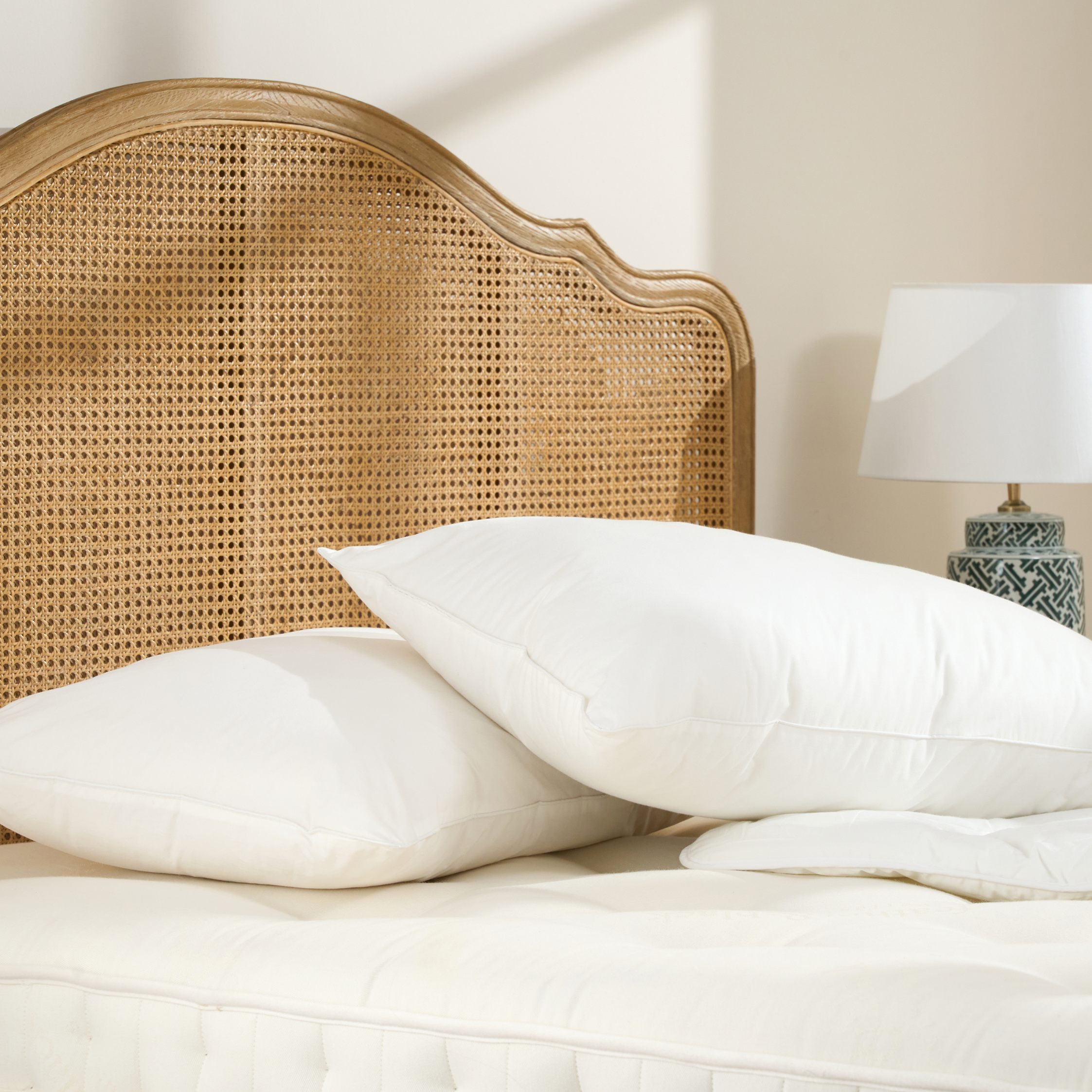Last Modified 14 March 2025 |
First Added 02 April 2020
How often should you change your bedding?
While slipping between soft, clean bedding in one of life’s greatest luxuries, changing bed sheets can often feel like one of life’s biggest chores. This begs the question: how often should you change your bed sheets? While the answer depends largely on your personal preferences, there are recommended guidelines to help maintain the hygiene, comfort and beauty of your bed linen.
Join us as we offer expert advice on how often bed sheets should be changed and explore how frequently your bedding should be replaced. Learn how to prolong the life of your linen and recognise the tell-tale signs that your duvet, pillows and bed sheets need a refresh. With our guidance, you can ensure your bed remains a luxurious, inviting and healthy retreat for many years to come.
How frequently should you wash and change your bed sheets?
A survey conducted by YouGov Real Time revealed that only 28% of the UK population wash their bedding regularly. Many experts recommend changing bed sheets every two weeks at the very least, but for the healthiest and most comfortable sleep environment, we suggest that you change bed linen once a week.
Ultimately, it is personal preference and circumstance that will dictate how often you should change your bed sheets. It’s important to consider external factors such as how much you perspire during the night, whether you allow pets to sleep in the bed or if you suffer with allergies to dust or mites. You should also bear in mind that over-washing bed linen can result in damage to finer fabrics, so always refer to the care instructions.

Why you need to stay on top of the bed linen laundry
Aside from the wonderful feeling of snuggling down between fresh sheets, staying on top of your bed linen laundry is essential for your health and hygiene. Your bed accumulates a significant amount of dust, dirt, sweat and skin cells over time, which can gather to create an environment that’s ripe for bacteria to thrive. Changing bed linen regularly can help eliminate these allergens, reducing the risk of respiratory issues and skin irritation, promoting better overall health and enhancing your sleep experience.
When to replace your bed sheet
While changing bed sheets habitually can help prolong the life of your linen, there will come a time when it needs to be replaced. Bed sheets can last anywhere from two to ten years, but this lifespan heavily depends on the quality and type of material they are made from. If you spot key signs of wear and tear, such as pilling, discolouration, loose stitching or fraying, it’s time to think about a refresh.
When selecting new bed sheets, investing in luxury linen expertly crafted from premium fabrics will ensure they last as long as possible. 100% organic cotton with a good thread count is an excellent choice, as it’s naturally hypoallergenic, breathable, soft, comfortable and easy to care for. Cotton bed sheets wash extremely well and can actually improve with age, staying sumptuously soft and in prime condition for many years.
How often should you replace your duvet?
Having answered the question ‘How often should you change bed sheets?’, it’s important to consider the rest of your bedding. As with bed sheets, a good-quality duvet should last for several years – the higher the quality, the longer the lifespan.
For enduring luxury, invest in superior materials that will stand the test of time, such as Hungarian goose down or premium British wool. Natural fillings are revered for their excellent rebound and loft, meaning they retain their shape and bounce exceptionally well over time.
As a rule, we recommend replacing your duvet every five to ten years, but you’ll be able to determine when it might be time for a refresh by paying attention to the following signs of wear and tear:
1) If your duvet starts to feel limp, lumpy or develops cold spots, it means the fillings have spread out or become uneven, resulting in inadequate insulation.
2) Duvets can discolour and collect dust mites over time, regardless of how often you clean them. If you notice discolouration or suspect dust mites, it's time for a change.
3) If you're using an anti-allergy duvet and begin sneezing more often or experiencing common allergy symptoms, it's a sign that you should consider replacing your duvet.
How often should you change pillows?
Your pillows are an integral element of your sleep sanctuary, offering essential support for your head and neck and working with your mattress to keep your spine in alignment. Like duvets, natural fillings are a popular choice as they provide long-lasting comfort and durability.
Our exquisite collection of luxury pillows includes premium British wool, sumptuous feather and down and indulgent memory foam, allowing you to choose the perfect pillow for your individual needs and preferences.
We recommend replacing your pillows every two to four years to ensure optimal neck and shoulder support and to reduce the risk of allergy-like symptoms. Pay careful attention to the following signs of wear and tear:
1) If you rest a pillow over your arm and it droops substantially, it’s time to replace it.
2) If your pillow is discoloured, lumpy or flat, or you experience neck ache, the filling has become worn and isn’t performing as well as it should.
3) If you’re an allergy sufferer and symptoms reappear, you should replace your anti-allergy pillow.

How can I make my bedding last longer?
How often you change your bed sheets will have a significant impact on the lifespan of your linen, but how can you ensure that your duvet and pillows last as long as possible? We've already established that higher quality means better durability, but here are three specific things to look out for before you invest in new bedding:
1) A cotton cover: Pure cotton is ultra-breathable, promoting airflow through the bedding to keep it fresh and bouncy, while ensuring you stay at just the right temperature as you sleep.
2) Boxed cassette construction: The fillings are sectioned into individual boxes across the duvet or pillow, ensuring they remain evenly spread and banishing the risk of unwanted lumps and bumps.
3) A high thread count: We work to a minimum of 233, which keeps your fillings contained and prevents feathers from poking through. Our 100% cotton covers create a secure outer layer that's also extra breathable for the sleeper.
When it comes to caring for your bedding, it’s recommended that pillows should be washed every two to three months and duvets washed at least twice a year. Feather & Black’s collection of luxury duvets and pillows are machine washable at 40°C, making them incredibly easy to look after. For more in-depth guidance on how to wash and care for your bedding, browse our step-by-step guide.
When should a mattress be replaced?
Our experts recommend that you should replace your mattress every six to eight years, but the exact timeframe will depend on various influencing factors. A well-crafted, high-quality mattress tailored to your sleeping habits and lifestyle will last longer than a poorly made mattress that doesn’t suit your needs. Additionally, the strain that the mattress endures over time from the weight and sleeping positions of those using it plays a significant role.
If your mattress is noticeably saggy or damaged in areas, or if it’s making more noise than usual, this could mean that the springs are damaged or worn. If you notice that you sleep better away from home, this could suggest that your mattress is the underlying issue. So, in answer to the question, ‘how often should you replace your mattress?’, it’s important to assess your individual situation to make a more informed decision.
Changing bed sheets regularly and replacing your bedding in good time is essential for creating a serene and sanitary sleep environment. By treating your luxury linen, duvets and pillows with thoughtful care and attention and following our guidance on how often you should change bed sheets, you can maintain the freshness and comfort of your bed for as long as possible.
Explore our premium collections to create a healthy, comfortable and inviting sanctuary, allowing you to drift into a blissful slumber night after night.
|
How often should you change bed sheets? |
Every 1-2 weeks |
|
How often should you replace bed sheets? |
Every 2-10 years |
|
How often should you wash a duvet? |
Every 6 months |
|
How often should you replace a duvet? |
Every 5-10 years |
|
How often should you wash pillows? |
Every 2-3 months |
|
How often should you replace pillows? |
Every 2-4 years |
|
How often should you replace a mattress? |
Every 7-10 years |